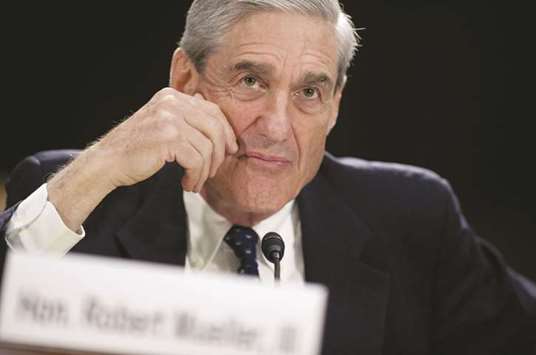Official Washington was abuzz this weekend over reports that a grand jury has charged at least one person stemming from the US probe of Russia’s attempts to tilt the 2016 presidential elections in Donald Trump’s favour.
There was no indication, in reporting by CNN that other media later confirmed, of who might be charged or what crimes might be alleged in the ongoing inquiry led by former FBI chief Robert Mueller.
But Trump, in a rapid burst of tweets yesterday, again denounced the investigation as a “witch hunt” and repeated his denials of any collusion with Russia.
Mueller’s team has remained mum about reports that a first arrest was imminent.
He is empowered to pursue not only Russian interference but any other crimes his large team of prosecutors should uncover.
But Chris Christie, a Republican governor close to Trump, said yesterday on ABC that “the important thing about today for the American people to know is the president is not under investigation.
And no one has told him that he is”.
Typically, such an inquiry would first target lower-level people while building a case against those higher up.
Representative Adam Schiff of California, the ranking Democrat on the House intelligence committee, demurred Sunday when asked whether Trump was under investigation. “I can’t answer that one way or the other,” he told ABC.
But he mentioned two possible targets on whom much speculation has focused: former national security adviser Michael Flynn and former Trump campaign director Paul Manafort, both of them once involved in undeclared lobbying for foreign interests.
It was not clear that Christie would know whether Trump is in fact being investigated. He may have been referring to a remark in May by former FBI chief James Comey, who told a Senate panel in May that Trump was not a target of the inquiry.
As the Mueller investigation nears a dramatic new phase, Republican officials and right-leaning media have stepped up their attacks on Democrats, above all on Trump’s rival in last year’s election, Hillary Clinton — attacks that Democrats dismiss as blatant attempts to divert attention.
Trump, in his tweets yesterday, again complained of Clinton’s handling of e-mails while secretary of state, of Democratic Party funding of what he said was a “fake” dossier on Trump’s background, and of a US sale during the Obama administration of uranium rights to Russia.
“There is so much GUILT by Democrats/Clinton, and now the facts are pouring out. DO SOMETHING!” Trump tweeted.
In the uranium case, Russian energy company Rosatom sought in 2010 to buy a share in Toronto-based UraniumOne.
A panel of nine US government agencies, including the State Department, approved the sale, though Clinton says she was “not personally involved”.
As Mueller’s inquiry advances, there have been calls from some Republicans — and from the conservative editorial board of the Wall Street Journal — for him to resign.
Christie cautioned on Sunday that the former FBI chief should be “very, very careful.”
Democrats meantime have warned that if Trump were to fire Mueller — or issue preemptive pardons to anyone caught in his net — it would be crossing a line.
Special counsels like Mueller are super sleuths with more power and independence than regular American investigators.
Unlike a US attorney, a special counsel has more leeway in carrying out a probe.
They are appointed when an investigation by a US attorney would present a conflict of interest or when, “under the circumstances, it would be in the public interest to appoint an outside Special Counsel to assume responsibility for the matter”, says the relevant law.
For instance, in 1999 Attorney General Janet Reno appointed Senator John Danforth to oversee a probe into the role of the FBI in a deadly assault in 1993 against the Branch Davidian sect in Waco, Texas — an assault that Reno had ordered.
A special counsel does not have to keep his or her superiors briefed on each step of the probe they are carrying out — even though the counsel does still answer to the Justice Department and thus, ultimately, to the president.
The attorney general or his or her deputy does not have to explain the criteria used in choosing someone to be a special counsel, who can even come from outside government.
That is the case with Mueller, who resigned from the law firm where he worked to take on this investigation.
Mueller was named by deputy attorney general Rod Rosenstein, to whom he will report.
Attorney General Jeff Sessions has recused himself from the Russia probe because he failed to state during his confirmation hearings that he had met with Russian officials.
A special counsel can issue subpoenas and ask for extra resources for a probe but must warn the attorney general or the deputy of important moves they plan to make in the investigation. The attorney general can oppose a procedural act that the special counsel wants to make.
And he or she can dismiss the counsel if that individual appears to have made a serious mistake or is in a situation of conflict of interest.
One of the best known special prosecutors was Archibald Cox, named to lead the Watergate investigation that led to Richard Nixon’s resignation in 1974.
Nixon wanted Cox fired after he issued subpoenas for copies of taped conversations Nixon made in the Oval Office. Attorney General Elliot Richardson refused to fire Cox, and resigned.
His deputy William Ruckelshaus did the same in what came to be known as the “Saturday Night Massacre”.

Robert Mueller
